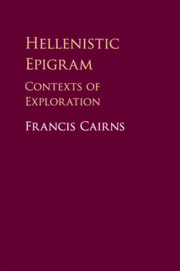Book contents
- Frontmatter
- Dedication
- Contents
- Preface
- Abbreviations
- 1 Introductory: Contexts and their Loss
- 2 Afterlives
- 3 Philosophical Matters
- 4 Temples and Shrines
- 5 Literary Polemics
- 6 Literary Polemics Continue
- 7 Poetry, Sex, the Countryside
- 8 Medical Connections
- 9 Epitaphs: Epigraphic or Epideictic?
- 10 Local Interests
- 11 Speakers, Addressees, Antecedents
- 12 The Erotic
- 13 Generic Innovation
- 14 Learning
- Bibliography
- Index Locorum
- Index Anthologiae Graecae
- Index of Personal Names in Epigrams
- General Index
6 - Literary Polemics Continue
Published online by Cambridge University Press: 12 October 2016
- Frontmatter
- Dedication
- Contents
- Preface
- Abbreviations
- 1 Introductory: Contexts and their Loss
- 2 Afterlives
- 3 Philosophical Matters
- 4 Temples and Shrines
- 5 Literary Polemics
- 6 Literary Polemics Continue
- 7 Poetry, Sex, the Countryside
- 8 Medical Connections
- 9 Epitaphs: Epigraphic or Epideictic?
- 10 Local Interests
- 11 Speakers, Addressees, Antecedents
- 12 The Erotic
- 13 Generic Innovation
- 14 Learning
- Bibliography
- Index Locorum
- Index Anthologiae Graecae
- Index of Personal Names in Epigrams
- General Index
Summary
The first centuries BC and AD saw a continuation among epigrammatists, both Greek and Roman, of anti-Callimacheanism. The poets involved built upon the mixed literary-polemical context exploited by their predecessors, in which both Callimachean and anti-Callimachean language and concepts could be used to subvert and deform Callimachus’ ideals. Many of their epigrams which criticise grammarians and Callimacheans come from the Garland of Philip; hence the cultural and political background to this movement has sometimes been identified as a reaction under Caligula against Tiberius’ taste for philological problems of the type pursued by grammatici. Tiberius certainly had a keen interest in such matters, and was an admirer of Euphorion, Rhianus and Parthenius, poets of a Callimachean bent; and Caligula indeed loathed everything connected with Tiberius. But Caligula's known literary eccentricities amounted only to thoughts of expunging the works of Homer, and plans, almost fulfilled, for removing those of Virgil and Livy from all libraries; these aspirations do not exactly mark out Caligula as anti- Callimachean. Moreover, Antipater of Thessalonica, who was a protégé of L. Calpurnius Piso Frugi (cos. 15 BC), the life-long friend and trusted colleague of Tiberius, attacked the grammatici in AP 11.20 = 20 GPh.(discussed below, pp.172–5); if this was such a sensitive subject, he would not have done so. The chronology too does not fit: apart from the early anti-grammarian Herodicus 1 FGE = SH no. 494, the bitterest of the epigrams attacking Callimacheans is Erucius AP 7.377 = 13 GPh. (see below pp.179–85), composed around the mid-first century BC.
Telchines and grammarians
The late- and post-Hellenistic epigrams criticising the Callimacheans are, on the whole, more strident than their predecessors, with gibes and openly insulting characterisations appearing frequently. For example, it will emerge from the study of several which revive Posidippus’ literary symbolism that they are much more explicitly anti-Callimachean than Posidippus. Their authors view the complex of imagery – thorns, a cicada, books (for them evidently implying bookworms too), toil, and possibly harvesting – assembled by Posidippus in AP 5.134 and AP 12.98 as emblematic of a conflict between the sort of poetry (especially epigrams) which is the product of love, wine, and ‘real’ life, and the more bookish poetry represented by Callimachus, particularly in his Aetia.
- Type
- Chapter
- Information
- Hellenistic EpigramContexts of Exploration, pp. 160 - 186Publisher: Cambridge University PressPrint publication year: 2016



